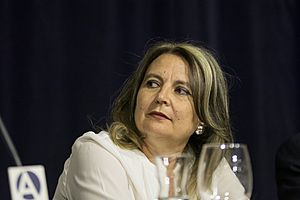Elvira Roca Barea facts for kids
María Elvira Roca Barea (born 1966) is a Spanish academic and writer. She studied philology, and specialized in the literature of the Middle Ages and early modern Europe. Her research work has primarily focused on narrative strategies in different literary periods, but she became famous for her work on the Spanish Black Legend.
Career
Born in El Borge (province of Málaga) in 1966, she earned a licentiate degree in Spanish Philology and later obtained a master's degree in Medieval Literature, and a PhD in Classical Philology at the University of Málaga. She has worked for the Spanish National Research Council (CSIC) and has lectured at Harvard University in the United States. She is the author of several scholarly publications regarding, mainly, rhetoric and the construction of images and discourses through theatre and literature.
She works as a secondary school teacher at the IES Huerta Alta in Alhaurín de la Torre.
Works
Imperiofobia y leyenda negra
Her 2016 book, "Imperiofobia y leyenda negra: Roma, Rusia, Estados Unidos y el Imperio español" (Empire-phobia and Black Legend: Rome, Russia, United States and the Spanish Empire) became a bestseller and won numerous awards. The book is a work of advocacy, with a preface that declares that the author doesn't plan on being exhaustive but on putting forward the lesser known information about various empires and their ideological rivals. Roca Barea coins the term "Imperiofobia" (from "imperio" meaning empire and the suffix equivalent to English "phobia") to refer to a characteristic, repetitive process of demonization through distortion and magnification that all multi-cultural empires suffer from neighbouring nations, given certain circumstances. She argues that the Spanish Black Legend is not a unique phenomenon, but a particularly persistent case of this broader phenomenon, which also affected other empires like ancient Rome and Ottoman Turkey, and is now affecting the modern United States, especially in the Islamic world.
In her book she offers a definition of both "empire" and "black legend". She then attempts to show the common elements and strategies shared by this discourse across nations and times, by deconstructing and exposing the similarities between the anti-American, anti-Russian, anti-Roman and anti-Spanish propaganda produced by their respective contemporaries, as well as the similarities in how the empires responded—or rather, did not respond.
The book served as the inspiration of the 2021 documentary film España, la primera globalización, in which Roca Barea herself participated.
Fracasología
Roca Barea's second book develops her main theory that a distorted representation of Spain's history exists due the hostility of France and the Protestant nations and extends it to what she views as misrepresentation of Spanish history at home. In Fracasología she argues that from the rise of the Bourbon dynasty, Spanish intellectuals have "fossilised self-contempt and uncritical admiration for modernity among Spaniards". According to José-Carlos Mainer, Barea argues in the work that self-criticism is something exclusive to Spaniards, and that it is also a negative trait, or a "sin".
Awards
In 2018 she was awarded the Medal of Andalusia and Medal of Honor of San Telmo awarded by the Andalusian government.
In 2019, Roca-Barea's "Imperiophobia and Leyenda Negra" won the Espasa-Calpe Award for works of literature, journalism and thought, awarded annually since 1984. According to the jury her work was "a magnificent essay, a brave revision which changes the traditional image of the history of Spain and the understanding that we Spaniards have of ourselves."
Political positions
In 2018, Roca Barea signed a manifesto entitled Manifiesto por la historia y la libertad promoted by the Francisco Franco National Foundation, rejecting the Law of Historical Memory as "an attack on constitutional rights to political opinion and an attempt to impose an official version of history". Roca Barea is an opponent of Catalan nationalism, which she believes to be incapable of moderation, and viewed the movement which led to the Catalan independence referendum of 2017 as a "rebellion of feudal elites".
See also
 In Spanish: Elvira Roca Barea para niños
In Spanish: Elvira Roca Barea para niños


